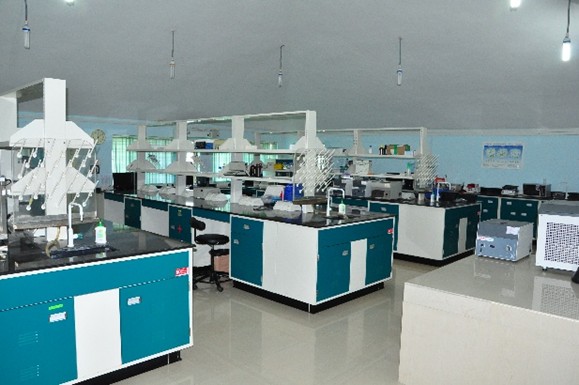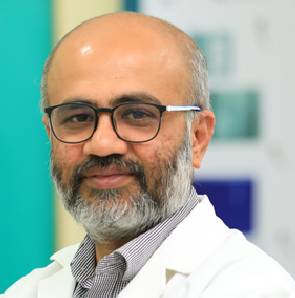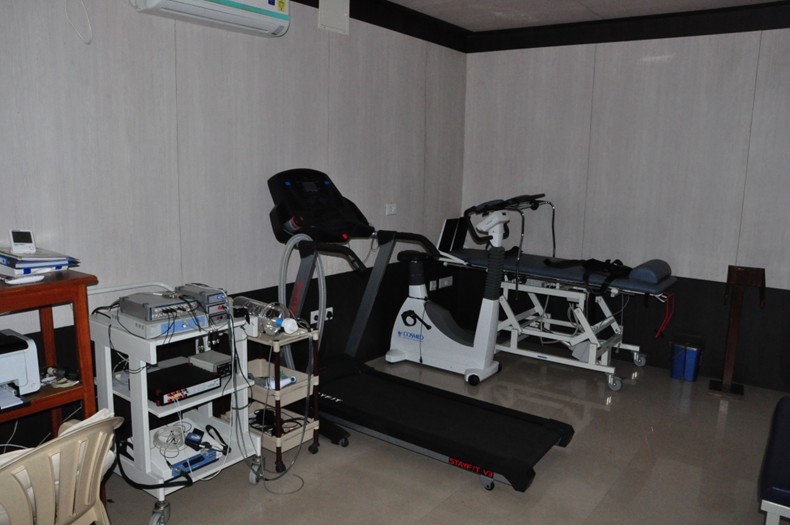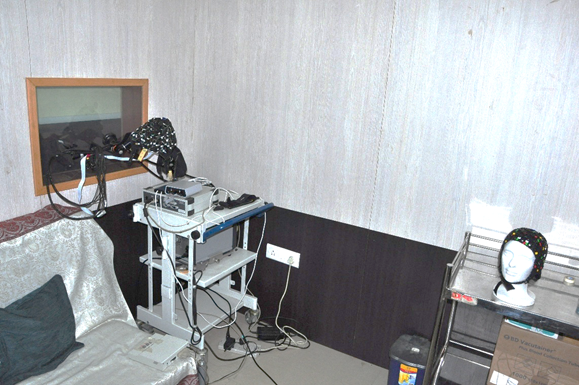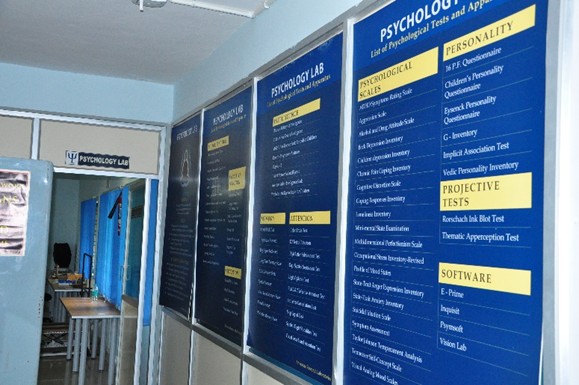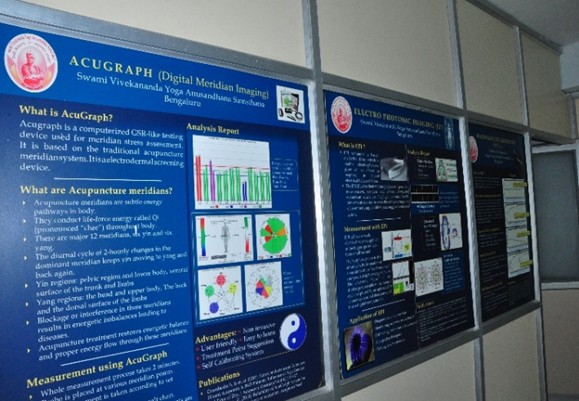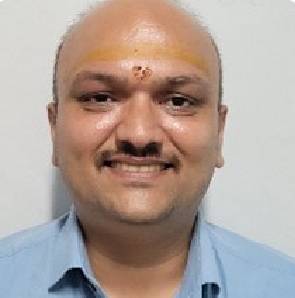
World-Class Research
Facilities at Anvesana
Research at Anvesana research laboratories is organized across five major disciplines, each with its strength, specialties and goals. Though there are several areas under investigation at each facility, the common theme is the emphasis on understanding the complex interplay between the physical, mental, social and spiritual planes of being. All the research disciplines also undertake fundamental studies providing opportunities for medical applications and standardization of tools. Anvesana Research Labs hosts advanced instrumentation, enabling the researcher to undertake deeper and detailed research in understanding multidimensional beneficial aspects of yoga practices.
advanced laboratories
The Molecular Bioscience laboratory is dedicated for understanding the important biological processes at the molecular level – with the goal of using this knowledge to tackle major problems in human health and disease. The Molecular Biosciences laboratory is an exclusive facility which focuses on the molecular basis of the effect of yogic practices. The techniques that are pioneered in our laboratory include DNA sequencing, microarrays, flow cytometry, fluorescent microscopy, high performance liquid chromatography, chemiluminescence, and 2D electrophoresis to name a few. The Molecular Bioscience group is working to understand the influence of yoga at the biochemical, genomic and proteomic levels in states of health and various diseases especially non-communicable diseases (NCDs). This work is likely to lead to a better understanding of the yoga practices which we hope to involve in the regulation of genes and interactions of proteins inside the cell.
Objectives
- To understand molecular dynamics of non-communicable diseases
- To understand the molecular mechanisms underlying stress
- Alleviation of complications of NCD’s through yoga practices
Research Facilities
- Next Generation Sequencing – Ion Torrent PGM
- Flow Cytometer – BD FACS Verse
- RT-PCR – Applied Biosystem 7500
- Microarray – Agilent Technologies
- Plate Reader – Perkin Elmer
- HPLC – for Protein Purification & Extraction
- Fluorescent Microscope – EVOS FL
This laboratory leads in the forefront of autonomic and metabolic functions testing. To name a few key contributions, an overall parasympathetic predominance and a considerable reduction in metabolic rate & oxygen consumption in yoga practitioners were demonstrated from this lab. Also, the capability of the autonomic nervous system to respond to stressful stimuli without getting stressed following yoga practices reported from this laboratory has gained great attention. Over recent years, it has significantly advanced the understanding of autonomic modulations resulting from yoga practices. The laboratory assesses the functions of the autonomic nervous system across different mental states, meditation, and breathing practices. Notably, its research has garnered attention for demonstrating how yoga practices can enhance the autonomic nervous system's resilience to stressful stimuli without inducing stress. The psychophysiology laboratory includes (i) Autonomic function testing lab (ii) Exercise physiology lab and (iii) Sleep lab.
Objectives
- To understand the regulatory effect of yoga practices on autonomic nervous system in normal and various pathologies
- To understand the metabolic changes during yoga practices
- To understand the sleep architecture and sleep quality
Research Facilities
- 16 Channel Polygraph with telemetry facility
- Metabolic and Pulmonary functions testing system
- Continuous Non- Invasive Blood Pressure (NIBP), Finometer MIDI
- 4 Channel portable Polygraph
- 55 channel polysomnography system - Philips Respironics Alice 5
The cognitive neuroscience laboratory through its multidisciplinary approach studies the neural underpinnings of human behavior, primarily using 128 channel dense EEG, and Evoked Potentials, functional Near Infrared Spectroscopy (fNIRS). The cognitive neuroscience research group targets to ascertain the role of yoga as a mindbody intervention in regulating the neural processes influencing cognition pertaining to various mental states. Recent studies from this group with f-MRI & dense array EEG has identified increased activity of cortical areas associated with working memory, and attention following cyclic meditation. Our dedicated team is at the forefront of investigating the transformative effects of yoga on the brain. By studying yoga as a mind-body intervention, we aim to reveal how it regulates neural processes and enhances cognitive functions across various mental states.
Objectives
- Understanding the basic neural processes that underlie complex higher order cognitive operations.
- Understanding the functional and neural mechanisms of cognitive processes related to yoga practices.
- Understand event related potentials [ERPs] while performing attention tasks related to yoga practices.
Research Facilities
- 128 Channel Electro Encephalogram (EEG)
- 64 Channel Functional Near Infrared Spectroscopy (fNIRS)
- Functional Transcranial Doppler Sonography (TCD)
- 16 Chanel Evoked Potential system
Psychology lab attempts at standardizing tools and designing theoretical frameworks from traditional knowledge, to address the specific needs of yoga research. The laboratory hosts a spectrum of facilities to assess cognition, physical abilities, professional skills using computerized tests. The laboratory has shown evidences to bring out the efficacy of yoga in performance, and cognitive abilities, following traditional Indian systems of education. Recently implicit tools were used to study inherent attitudes and preferences in yoga population. The laboratory is working further to develop specific tools for assessment for yoga research integrating the western methodologies and the concepts of Indian psychology.
Objectives
- Understanding and development of human psychological strengths
- Developing & standardizing the psychological measurement for AYUSH systems of medicine
- To measure mental processes from simple motor performance to complex problem-solving skill
- To understand cause and management of psychological disorder from the perspective of traditional knowledge
Research Facilities
INQUISIT Software: a platform for designing and administering psychological tests and experiments. Various psychological tests can be performed using the tool. I In addition to that there are instruments to assess Motor Function, Perception, Executive Function, Attention, Intelligence, Memory & Creativity, Personality Tests
The Bio-Energy laboratory explores subtle energy aspects of biological and inanimate systems. The facilities of the lab include Electrophotonic Imaging a Kirlian principle based system for subtle energy measurements; Acugrapha electrodermal assessment based on Chinese traditional medicine system; Nadi Tarangini- an indigenous pulse based diagnostic system for assessment of tridosha (vata, pitta, kapha) based on Ayurveda principle and Random Event Generator to study the influence of human mind on the hypothetical consciousness field & power of intention of individuals. Recognizing the need for standardization of subtle energy measuring instruments, initial work of the Laboratory involved experiments to validate these instruments to meet the scientific standards. Using these tools later research showed effect of yoga in organism’s regulation at subtler levels. Evidence from these experiments supports the existence of subtler dimensions like pranamaya kosa. Future directions of the lab include developing ability to assess a person’s state of health using non-invasive subtle energy tools, complementing the modern methods of diagnosis, resulting in early detection of manifestation of diseases.
Objectives
- To track scientifically the subtle human energy field
- To establish scientific evidences for scriptural concepts like Aadhi and Vyadhi
- To cater to the clinical need of patients with various ailments, especially earlier diagnosis of disease before its physical manifestation.
Research Facilities
- Gas Discharge Visualization (GDV)
- Bio-well
- Acugraph
- Random Event Generator

